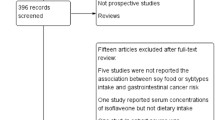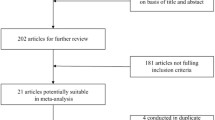Abstract
Background
Epidemiological findings on the association between soybean product consumption and gastric cancer risk remain inconsistent. We evaluated the relationship between soybean product consumption and the risk of gastric cancer in a prospective cohort study in Korea.
Methods
This prospective cohort study included a total of 139,267 participants aged 40–69 years from the Health Examinees-Gem (HEXA-G) study between 2004 and 2013. Information on cancer diagnosis was retrieved from the Korea Central Cancer Registry until 31 December 2018. Multivariate hazard ratios (HRs) and 95% of confidence intervals (CIs) for the risk of gastric cancer according to the consumption of soybean products were estimated using Cox proportional hazards models.
Results
A total of 767 incident cases of gastric cancer occurred over an average follow-up period of 9.21 years. We found that men who consumed two servings per week had 37% lower risk of gastric cancer compared with who consume those who almost never consumed (HR for tofu consumption of more than two servings/week vs. almost never consumed was 0.63 (95% CI 0.45, 0.89); p for trend = 0.04). Among men with a BMI of less than 25 kg/m2, increased consumption of soybean paste (p for trend = 0.02) and tofu (HR 0.51 (95% CI 0.32, 0.82 for more than two servings/week vs. almost never consumed); p for trend = 0.01) was associated with decreased risk of gastric cancer.
Conclusion
Our results suggest that a high consumption of soybean products has a protective effect against gastric cancer.
Similar content being viewed by others
Data availability
Data from the Health Examinees (HEXA) study is part of the Korean Genome and Epidemiology Study (KoGES), conducted by Korea Disease Control and Prevention Agency (KDCA), Republic of Korea. The Korea Central Cancer Registry (KCCR) data is provisioned by the KDCA in cooperation with the National Cancer Center of Korea as a part of the KoGES. The dataset used for the analysis in this study is maintained and managed by the Division of Population Health Research at the National Institute of Health, which is a part of the KDCA. The HEXA Study dataset has been merged with the cancer registry data provided by National Cancer Center of Korea in a collaborative agreement.
References
Bray F, Ferlay J, Soerjomataram I, Siegel RL, Torre LA, Jemal A (2018) Global cancer statistics 2018: GLOBOCAN estimates of incidence and mortality worldwide for 36 cancers in 185 countries. CA Cancer J Clin 68(6):394–424. https://doi.org/10.3322/caac.21492
Hong S, Won Y-J, Park YR, Jung K-W, Kong H-J, Lee ES (2020) Cancer statistics in Korea: incidence, mortality, survival, and prevalence in 2017. Cancer Res Treat Off J Korean Cancer Assoc 52(2):335. https://doi.org/10.4143/crt.2020.206
Ferlay J, Soerjomataram I, Dikshit R et al (2015) Cancer incidence and mortality worldwide: sources, methods and major patterns in GLOBOCAN 2012. Int J Cancer 136(5):E359–E386. https://doi.org/10.1002/ijc.29210
Uemura N, Okamoto S, Yamamoto S et al (2001) Helicobacter pylori infection and the development of gastric cancer. N Engl J Med 345(11):784–789. https://doi.org/10.1056/NEJMoa001999
González CA, Pera G, Agudo A et al (2003) Smoking and the risk of gastric cancer in the European prospective investigation into cancer and nutrition (EPIC). Int J Cancer 107(4):629–634. https://doi.org/10.1002/ijc.11426
Duell EJ, Travier N, Lujan-Barroso L et al (2011) Alcohol consumption and gastric cancer risk in the European prospective investigation into cancer and nutrition (EPIC) cohort. Am J Clin Nutr 94(5):1266–1275. https://doi.org/10.3945/ajcn.111.012351
Tokui N, Yoshimura T, Fujino Y et al (2005) Dietary habits and stomach cancer risk in the JACC study. J Epidemiol. https://doi.org/10.2188/jea.15.S98
Kim HJ, Chang WK, Kim MK, Lee SS, Choi BY (2002) Dietary factors and gastric cancer in Korea: a case-control study. Int J Cancer 97(4):531–535. https://doi.org/10.1002/ijc.10111
Tsugane S, Sasazuki S, Kobayashi M, Sasaki S (2004) Salt and salted food intake and subsequent risk of gastric cancer among middle-aged Japanese men and women. Br J Cancer 90(1):128–134. https://doi.org/10.1038/sj.bjc.6601511
van den Brandt PA, Botterweck AA, Goldbohm RA (2003) Salt intake, cured meat consumption, refrigerator use and stomach cancer incidence: a prospective cohort study (Netherlands). Cancer Causes Control 14(5):427–438. https://doi.org/10.1023/A:1024979314124
Larsson SC, Bergkvist L, Wolk A (2006) Processed meat consumption, dietary nitrosamines and stomach cancer risk in a cohort of Swedish women. Int J Cancer 119(4):915–919. https://doi.org/10.1002/ijc.21925
Korea Health Industry Development Institute. National food and nutrition statistics: based on 2018 Korea National Health and Nutrition Examination Survey. Korea Health Industry Development Institute, Osong, Korea. 2018. https://www.khidi.or.kr/kps/dhraStat/result4?menuId=MENU01655&gubun=&year=2018 (Accessed on 5, Jan 2021).
Ko K-P, Park SK, Yang JJ et al (2013) Intake of soy products and other foods and gastric cancer risk: a prospective study. J Epidemiol. https://doi.org/10.2188/jea.JE20120232
Wada K, Tsuji M, Tamura T et al (2015) Soy isoflavone intake and stomach cancer risk in J apan: From the T akayama study. Int J Cancer 137(4):885–892. https://doi.org/10.1002/ijc.29437
Umesawa M, Iso H, Fujino Y, Kikuchi S, Tamakoshi A (2016) Salty food preference and intake and risk of gastric cancer: the JACC study. J Epidemiol 26(2):92–97. https://doi.org/10.2188/jea.JE20150023
Health Examinees Study Group (2015) The health examinees (hexa) study: rationale, study design and baseline characteristics. Asian Pac J Cancer Prev 16(4):1591. https://doi.org/10.7314/apjcp.2015.16.4.1591
Kim Y, Han BG, the KoGES Group (2017) Cohort profile: the Korean genome and epidemiology study (KoGES) consortiu. Int J Epidemiol. https://doi.org/10.1093/ije/dyv316
Shin S, Lee H-W, Kim CE et al (2017) Egg consumption and risk of metabolic syndrome in Korean adults: results from the health examinees study. Nutrients 9(7):687. https://doi.org/10.3390/nu9070687
Ahn Y, Kwon E, Shim J et al (2007) Validation and reproducibility of food frequency questionnaire for Korean genome epidemiologic study. Eur J Clin Nutr 61(12):1435–1441. https://doi.org/10.1038/sj.ejcn.1602657
Korean Nutrition Society. Food Composition Table. In: Recommended dietary allowances for Koreans, 7th edition. Seoul: The Korean Nutrition Society. The Korean Nutrition Society Seoul. Korea. 2000.
Kom EL, Graubard BI, Midthune D (1997) Time-to-event analysis of longitudinal follow-up of a survey: choice of the time-scale. Am J Epidemiol 145(1):72–80. https://doi.org/10.1093/oxfordjournals.aje.a009034
Kweon SS, Shu XO, Xiang Y et al (2013) Intake of specific nonfermented soy foods may be inversely associated with risk of distal gastric cancer in a Chinese population. J Nutr 143(11):1736–1742. https://doi.org/10.3945/jn.113.177675
Sauvaget C, Lagarde F, Nagano J et al (2005) Lifestyle factors, radiation and gastric cancer in atomic-bomb survivors (Japan). Cancer Causes Control 16(7):773–780. https://doi.org/10.1007/s10552-005-5385-x
Hara A, Sasazuki S, Inoue M et al (2012) Isoflavone intake and risk of gastric cancer: a population-based prospective cohort study in Japan. Am J Clin Nutr 95(1):147–154. https://doi.org/10.3945/ajcn.111.020479
Seel D, Kawabata T, Nakamura M et al (1994) N-nitroso compounds in two nitrosated food products in southwest Korea. Food Chem Toxicol 32(12):1117–1123. https://doi.org/10.1016/0278-6915(94)90127-9
Sarkar FH, Li Y (2002) Mechanisms of cancer chemoprevention by soy isoflavone genistein. Cancer Metastasis Rev 21(3–4):265–280. https://doi.org/10.1023/A:1021210910821
Liggins J, Bluck LJ, Runswick S et al (2000) Daidzein and genistein content of fruits and nuts. J Nutr Biochem 11(6):326–331. https://doi.org/10.1016/S0955-2863(00)00085-1
Tatsuta M, Iishi H, Baba M et al (1999) Attenuation by genistein of sodium-chloride-enhanced gastric carcinogenesis induced by N-methyl-N′-nitro-N-nitrosoguanidine in Wistar rats. Int J Cancer 80(3):396–399. https://doi.org/10.1002/(SICI)1097-0215(19990129)80:3%3c396
Zhou HB, Chen JM, Cai JT, Du Q, Wu CN (2008) Anticancer activity of genistein on implanted tumor of human SG7901 cells in nude mice. World J Gastroenterol: WJG 14(4):627. https://doi.org/10.3748/wjg.14.627
Yanagihara K, Ito A, Toge T, Numoto M (1993) Antiproliferative effects of isoflavones on human cancer cell lines established from the gastrointestinal tract. Cancer Res 53(23):5815–5821
Verdrengh M, Collins LV, Bergin P, Tarkowski A (2004) Phytoestrogen genistein as an anti-staphylococcal agent. Microbes Infect 6(1):86–92. https://doi.org/10.1016/j.micinf.2003.10.005
Mace TA, Ware MB, King SA et al (2019) Soy isoflavones and their metabolites modulate cytokine-induced natural killer cell function. Sci Rep 9(1):5068. https://doi.org/10.1038/s41598-019-41687-z
Ma Y, Wu X, Giovanni V, Meng X (2017) Effects of soybean oligosaccharides on intestinal microbial communities and immune modulation in mice. Saudi J Biol Sci 24(1):114–121. https://doi.org/10.1016/j.sjbs.2016.09.004
Yang YG, Lindahl T, Barnes DE (2007) Trex1 exonuclease degrades ssDNA to prevent chronic checkpoint activation and autoimmune disease. Cell 131(5):873–886. https://doi.org/10.1016/j.cell.2007.10.017
Mazumder B, Seshadri V, Fox PL (2003) Translational control by the 3′-UTR: the ends specify the means. Trends Biochem Sci 28(2):91–98. https://doi.org/10.1016/S0968-0004(03)00002-1
Zhu H, Li X, Zhang X et al (2016) Polymorphisms in mismatch repair genes are associated with risk and microsatellite instability of gastric cancer, and interact with life exposures. Gene 579(1):52–57. https://doi.org/10.1016/j.gene.2015.12.050
Karsli-Ceppioglu S, Ngollo M, Adjakly M et al (2015) Genome-wide DNA methylation modified by soy phytoestrogens: role for epigenetic therapeutics in prostate cancer? OMICS 19:209–219. https://doi.org/10.1089/omi.2014.0142
Merry AH, Schouten LJ, Goldbohm RA, van den Brandt PA (2007) Body mass index, height and risk of adenocarcinoma of the oesophagus and gastric cardia: a prospective cohort study. Gut 56(11):1503–1511. https://doi.org/10.1136/gut.2006.116665
Lindblad M, Rodríguez LAG, Lagergren J (2005) Body mass, tobacco and alcohol and risk of esophageal, gastric cardia, and gastric non-cardia adenocarcinoma among men and women in a nested case-control study. Cancer Causes Control 16(3):285–294. https://doi.org/10.1007/s10552-004-3485-7
Nilsson M, Johnsen R, Ye W, Hveem K, Lagergren J (2003) Obesity and estrogen as risk factors for gastroesophageal reflux symptoms. JAMA 290(1):66–72
Calle EE, Kaaks R (2004) Overweight, obesity and cancer: epidemiological evidence and proposed mechanisms. Nat Rev Cancer 4(8):579–591. https://doi.org/10.1038/nrc1408
Furukawa H, Iwanaga T, Koyama H, Taniguchi H (1982) Effect of sex hormones on carcinogenesis in the stomachs of rats. Cancer Res 42(12):5181–5182
Singh S, Poulsom R, Wright N, Sheppard M, Langman M (1997) Differential expression of oestrogen receptor and oestrogen inducible genes in gastric mucosa and cancer. Gut 40(4):516–520. https://doi.org/10.1136/gut.40.4.516
Pfeilschifter J, Köditz R, Pfohl M, Schatz H (2002) Changes in proinflammatory cytokine activity after menopause. Endocr Rev 23(1):90–119. https://doi.org/10.1210/edrv.23.1.0456
Fox JG, Wang TC (2007) Inflammation, atrophy, and gastric cancer. J Clin Invest 117(1):60–69. https://doi.org/10.1172/JCI30111
Ko KP, Park SK, Park B et al (2010) Isoflavones from phytoestrogens and gastric cancer risk: a nested case-control study within the Korean multicenter cancer cohort. Cancer Epidemiol Biomark Prev 19(5):1292–1300. https://doi.org/10.1158/1055-9965.EPI-09-1004
Chun OK, Chung SJ, Song WO (2009) Urinary isoflavones and their metabolites validate the dietary isoflavone intakes in US adults. J Am Diet Assoc 109(2):245–254. https://doi.org/10.1016/j.jada.2008.10.055
González CA, Pera G, Agudo A et al (2006) Fruit and vegetable intake and the risk of stomach and oesophagus adenocarcinoma in the European prospective investigation into cancer and nutrition (EPIC–EURGAST). Int J Cancer 118(10):2559–2566. https://doi.org/10.1002/ijc.21678
Lee SA, Kang D, Shim K et al (2003) Original article effect of diet and Helicobacter pylori infection to the risk of early gastric cancer. J Epidemiol 13(3):162–168. https://doi.org/10.2188/jea.13.162
Acknowledgements
This study was supported by the National Genome Research Institute, Korea Centers for Disease Control and Prevention, and by a grant from the Seoul National University Hospital.
Funding
This work was supported by the Research Program funded by the Korea Centers for Disease Control and Prevention [grant number 2004-E71004-00; 2005-E71011-00; 2005-E71009-00; 2006-E71001-00; 2006-E71004-00; 2006-E71010-00; 2006E71003-00; 2007-E71004-00; 2007-E71006-00; 2008-E7100600; 2008-E71008-00; 2009-E71009-00; 2010-E71006-00; 2011E71006-00; 2012-E71001-00; 2013-E71009-00]. This funding source had roles in study design and data collection.
Author information
Authors and Affiliations
Contributions
WKS and DK designed and performed the data analysis and drafted the first manuscript. AS, JKL and DK collected the data and obtained study funding. HWL, DH, KT, AS, JL, JEL and DK provided critical review of the manuscript for important intellectual content.
Corresponding author
Ethics declarations
Conflict of interest
The authors declare no conflict of interest.
Rights and permissions
Springer Nature or its licensor (e.g. a society or other partner) holds exclusive rights to this article under a publishing agreement with the author(s) or other rightsholder(s); author self-archiving of the accepted manuscript version of this article is solely governed by the terms of such publishing agreement and applicable law.
About this article
Cite this article
Shin, WK., Lee, HW., Huang, D. et al. Soybean product consumption decreases risk of gastric cancer: results from the Health Examinees Study. Eur J Nutr 62, 1743–1753 (2023). https://doi.org/10.1007/s00394-023-03115-x
Received:
Accepted:
Published:
Issue Date:
DOI: https://doi.org/10.1007/s00394-023-03115-x




